Fleurs du Mal Magazine


Or see the index

Sleep Now,
O Sleep Now
Sleep now, O sleep now,
O you unquiet heart!
A voice crying “Sleep now”
Is heard in my heart.
The voice of the winter
Is heard at the door.
O sleep, for the winter
Is crying “Sleep no more.”
My kiss will give peace now
And quiet to your heart — –
Sleep on in peace now,
O you unquiet heart!
James Joyce
(1882-1941)
Sleep Now, O Sleep Now
fleursdumal.nl magazine
More in: Archive I-J, Archive I-J, Joyce, James, Joyce, James
Rainer Maria Rilke feierte die Liebe, verschrieb sich ihr mit ganzer Seele. Die Frauen standen für ihn im Mittelpunkt.
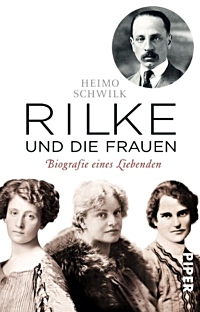 Angefangen bei seiner innig geliebten Mutter Sophia und der gestrengen »Übermutter« Lou Andreas-Salomé über die Bildhauerin Clara Westhoff bis zu der großzügigen Mäzenin Fürstin von Thurn und Taxis. In seiner neuen, meisterlich geschriebenen Biografie erzählt Heimo Schwilk von diesen Frauen und ihren Schicksalen.
Angefangen bei seiner innig geliebten Mutter Sophia und der gestrengen »Übermutter« Lou Andreas-Salomé über die Bildhauerin Clara Westhoff bis zu der großzügigen Mäzenin Fürstin von Thurn und Taxis. In seiner neuen, meisterlich geschriebenen Biografie erzählt Heimo Schwilk von diesen Frauen und ihren Schicksalen.
Ein Buch über die Liebe – und wie sie sich in großer Dichtung vollendet.
Heimo Schwilk, geboren 1952 in Stuttgart, Dr. phil., ist Autor zahlreicher Bücher über Politik und Literatur. Seine großen Biografien über Ernst Jünger und Hermann Hesse wurden im In- und Ausland hoch gelobt. Er war lange Jahre Leitender Redakteur der Welt am Sonntag und lebt in Berlin. 1991 wurde er mit dem Theodor-Wolff-Preis für herausragenden Journalismus ausgezeichnet.
Heimo Schwilk
Rilke und die Frauen
Biografie eines Liebenden
‘Piper’ Taschenbuch
Piper Verlag GmbH
Mit 22 Abbildungen
EAN: 9783492308878
ISBN: 3492308872
2016
336 Seiten
kartoniert
€ 11,00
new books
fleursdumal.nl magazine
More in: - Book News, Archive Q-R, Archive Q-R, Archive S-T, Art & Literature News, Rilke, Rainer Maria, The Ideal Woman
Gathered on the occasion of Robert Lowell’s one hundredth birthday, New Selected Poems offers a fresh and illuminating representation of one of the great careers in twentieth-century poetry.
 The renowned and controversial author of many books of poems, plays, and translations, Lowell was one of the United States’ most honoured poets, winning the Pulitzer Prize in Poetry in 1947 and 1974, the National Book Award, and the National Book Critics Circle Award.
The renowned and controversial author of many books of poems, plays, and translations, Lowell was one of the United States’ most honoured poets, winning the Pulitzer Prize in Poetry in 1947 and 1974, the National Book Award, and the National Book Critics Circle Award.
His ongoing interrogation of his family legacy, his personal struggle with manic depression, and his mastery of the tradition of poetry in English formed the groundbreaking autobiographical foundation of Life Studies (1959) and the books that followed it, including For the Union Dead (1964), Near the Ocean (1967), History (1973), and Day by Day (1977).
Katie Peterson’s incisive selection of Lowell’s poems draws attention to ‘the perishability of life, its twinned quality of fragility and repetition, as framed by the structured evanescence of daily consciousness.’ Lowell’s own intense dramas and struggles are the substrate he drew on in his restless search to make sense of, and fix, shape-shifting experience – not his, but ours. As Peterson says, Lowell was ‘constitutionally immune to any stultifying permanence either of form or of spirit.’ Her brilliant new reading of Lowell shows us his work constantly breaking, renewing, transforming, as he strives restlessly, over and over, to find an elusive unity.
Robert Lowell (1917-1977) was born in Boston. He was recognised as an accomplished poet in his own lifetime, and along with Elizabeth Bishop, John Berryman and Sylvia Plath he created the fashion and generated the force of American poetry over the 1950s, 60s, and 70s. Life Studies, published in 1959, marked a watershed. It initiated an autobiographical project which would dominate his oeuvre thereafter, and is now regarded as one of the most influential books of the century. He received a Pulitzer Prize for Lord Weary’s Castle (1946) and another for The Dolphin (1973).
New Selected Poems
by Robert Lowell (Author),
Katie Peterson (Editor)
ISBN 9780571339488
Format Paperback
Published 03/08/2017
Length 272 pages
£14.99
Publisher: Farrar, Straus and Giroux
Language: English
ISBN-10: 0374251339
ISBN-13: 978-0374251338
new poetry books
fleursdumal.nl magazine
More in: - Book News, Archive K-L, Archive K-L, Art & Literature News, Robert Lowell
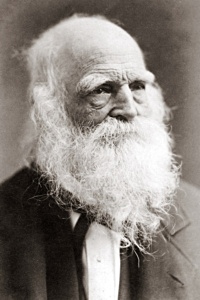
To the Fringed Gentian
Thou blossom bright with autumn dew,
And coloured with the heaven’s own blue,
That openest when the quiet light
Succeeds the keen and frosty night.
Thou comest not when violets lean
O’er wandering brooks and springs unseen,
Or columbines, in purple dressed,
Nod o’er the ground-bird’s hidden nest.
Thou waitest late and com’st alone,
When woods are bare and birds are flown,
And frosts and shortening days portend
The aged year is near his end.
Then doth thy sweet and quiet eye
Look through its fringes to the sky,
Blue—blue—as if that sky let fall
A flower from its cerulean wall.
I would that thus, when I shall see
The hour of death draw near to me,
Hope, blossoming within my heart,
May look to heaven as I depart.
William Cullen Bryant
(1794-1878)
To the Fringed Gentian
fleursdumal.nl magazine
More in: Archive A-B, Archive A-B, CLASSIC POETRY
An “astounding” (Terrance Hayes) debut collection of poems – Winner of the 2016 National Poetry Series Competition
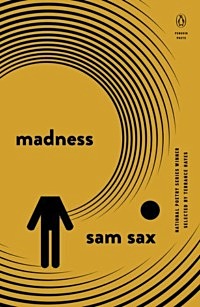 In this powerful debut collection, sam sax explores and explodes the linkages between desire, addiction, and the history of mental health. These brave, formally dexterous poems examine antiquated diagnoses and procedures from hysteria to lobotomy; offer meditations on risky sex; and take up the poet’s personal and family histories as mental health patients and practitioners.
In this powerful debut collection, sam sax explores and explodes the linkages between desire, addiction, and the history of mental health. These brave, formally dexterous poems examine antiquated diagnoses and procedures from hysteria to lobotomy; offer meditations on risky sex; and take up the poet’s personal and family histories as mental health patients and practitioners.
Ultimately, Madness attempts to build a queer lineage out of inherited language and cultural artifacts; these poems trouble the static categories of sanity, heterosexuality, masculinity, normality, and health. sax’s innovative collection embodies the strange and disjunctive workings of the mind as it grapples to make sense of the world around it.
About the Author: sam sax is a queer Jewish writer and educator. He’s received fellowships from the National Endowment for the Arts, Lambda Literary, The MacDowell Colony, the Blue Mountain Center, and the Michener Center for Writers. He’s the winner of the 2016 Iowa Review Award and his poems have appeared in The American Poetry Review, Gulf Coast, Ploughshares, Poetry, and other journals.
Madness
By Sam Sax
Part of National Poetry Series
Category: Poetry
Published by Penguin Books
Paperback
Sep. 2017
96 Pages
$18.00
ISBN 9780143131700
new poetry
fleursdumal.nl magazine
More in: - Book News, Archive S-T, Art & Literature News, EDITOR'S CHOICE
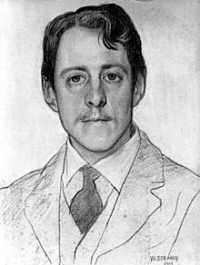
The Pity of It
I walked in loamy Wessex lanes, afar
From rail-track and from highway, and I heard
In field and farmstead many an ancient word
Of local lineage like “Thu bist,” “Er war,”
“Ich woll,” “Er sholl,” and by-talk similar,
Nigh as they speak who in this month’s moon gird
At England’s very loins, thereunto spurred
By gangs whose glory threats and slaughters are.
Then seemed a Heart crying: “Whosoever they be
At root and bottom of this, who flung this flame
Between folk kin tongued even as are we,
“Sinister, ugly, lurid, be their fame;
May their familiars grow to shun their name,
And their brood perish everlastingly.”
Laurence Binyon
(1869 – 1943)
The Pity of It
fleursdumal.nl magazine
More in: Archive A-B, CLASSIC POETRY, WAR & PEACE
A powerful new collection of poetry from the National Book Critics Circle Award nominee and recipient of the Forward Poetry Prize.
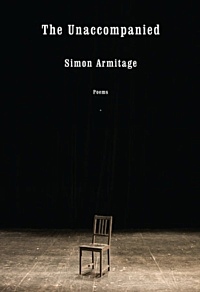
In The Unaccompanied, Armitage gives voice to the people of Britain with a haunting grace.
We meet characters whose sense of isolation is both emotional and political, both real and metaphorical, from a son made to groom the garden hedge as punishment, to a nurse standing alone at a bus stop as the centuries pass by, to a latter-day Odysseus looking for enlightenment and hope in the shadowy underworld of a cut-price supermarket.
We see the changing shape of England itself, viewed from a satellite “like a shipwreck’s carcass raised on a sea-crane’s hook, / nothing but keel, beams, spars, down to its bare bones.”
In this exquisite collection, Armitage X-rays the weary but ironic soul of his nation, with its “Songs about mills and mines and a great war, / lines about mermaids and solid gold hills, / songs from broken hymnbooks and cheesy films”–in poems that blend the lyrical and the vernacular, with his trademark eye for detail and biting wit.
Simon Armitage was born in West Yorkshire and is Professor of Poetry at the University of Sheffield. A recipient of numerous prizes and awards, he has published eleven collections of poetry, including Seeing Stars, Paper Aeroplane: Selected Poems 1989 – 2014, and his acclaimed translation of Sir Gawain and the Green Knight.
The Shout: Selected Poems, was nominated for the National Book Critics Circle Award and his translation of the medieval poem Pearl received the 2017 PEN Award for Poetry in Translation. He writes extensively for radio and television, has published three best-selling non-fiction titles, and his theatre works include The Last Days of Troy, performed at Shakespeare’s Globe in London. He has taught at the University of Iowa’s Writers’ Workshop, and in 2015 was appointed Professor of Poetry at Oxford University.
Simon Armitage
The Unaccompanied
Poems
Published by Knopf
Hardcover
$27.00
Aug. 2017
96 Pages
ISBN 9781524732424
new poetry
fleursdumal.nl magazine
More in: #Editors Choice Archiv, - Book News, Archive A-B, Archive A-B, Armitage, Simon, Art & Literature News, Mermaids

Ontgoocheling
Laat mij niet almaar zinloos lijden,
Zeg niet dat jij nog van mij houdt,
Wat er ook was in vroeger tijden,
Het laat mijn arme hart nu koud!
Nee, ik geloof niet in jouw liefde,
Nee, ik geloof daar niet meer aan,
Sinds jij mijn arme ziel zo griefde,
Kan ik mij niet meer laten gaan!
Vergeet de uren, thans vervlogen,
Vergroot de blinde wanhoop niet,
Mijn zieke hart, zozeer bedrogen,
Zag graag dat jij het rusten liet!
Ik slaap, ben net in slaap gevallen,
Vergeet jouw dromen van weleer,
Wat er ook was, ‘t is ons ontvallen,
Dit hart krijg jij niet wakker meer.
Jevgeni Baratynski,
(1800 – 1844)
Разуверение,
gedicht 1821,
vertaling Paul Bezembinder, 2016.
(Meer over Paul Bezembinder is te vinden op zijn website: www.paulbezembinder.nl)
fleursdumal.nl magazine
More in: Archive A-B, Archive A-B, Baratynski, Bezembinder, Paul, CLASSIC POETRY
The year 1818 saw the publication of one of the most influential science-fiction stories of all time.
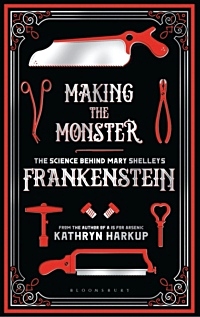 Frankenstein: Or, Modern Prometheus by Mary Shelley had a huge impact on gothic horror and science-fiction genres, and her creation has become part of our everyday culture, from cartoons to Hallowe’en costumes. Even the name ‘Frankenstein’ has become a by-word for evil scientists and dangerous experiments. How did a teenager with no formal education come up with the idea for an extraordinary novel such as Frankenstein?
Frankenstein: Or, Modern Prometheus by Mary Shelley had a huge impact on gothic horror and science-fiction genres, and her creation has become part of our everyday culture, from cartoons to Hallowe’en costumes. Even the name ‘Frankenstein’ has become a by-word for evil scientists and dangerous experiments. How did a teenager with no formal education come up with the idea for an extraordinary novel such as Frankenstein?
Clues are dotted throughout Georgian science and popular culture. The years before the book’s publication saw huge advances in our understanding of the natural sciences, in areas such as electricity and physiology, for example. Sensational science demonstrations caught the imagination of the general public, while the newspapers were full of lurid tales of murderers and resurrectionists.
Making the Monster explores the scientific background behind Mary Shelley’s book. Is there any science fact behind the science fiction? And how might a real-life Victor Frankenstein have gone about creating his monster? From tales of volcanic eruptions, artificial life and chemical revolutions, to experimental surgery, ‘monsters’ and electrical experiments on human cadavers, Kathryn Harkup examines the science and scientists that influenced Shelley, and inspired her most famous creation.
Kathryn Harkup is a chemist and author. Kathryn completed a PhD then a postdoc at the University of York before realising that talking, writing and demonstrating science appealed far more than spending hours slaving over a hot fume-hood. Kathryn went on to run outreach in engineering, computing, physics and maths at the University of Surrey, which involved writing talks on science and engineering topics that would appeal to bored teenagers, and she is now a science communicator delivering talks and workshops on the quirky side of science.
Making the Monster
The Science Behind Mary Shelley’s Frankenstein
By: Kathryn Harkup
Published: 08-02-2018
Format: Hardback
Edition: 1st
Extent: 304 pp
ISBN: 9781472933737
Imprint: Bloomsbury Sigma
Illustrations: 11 black and white illustrations
Dimensions: 216 x 135 mm
£16.99
new books
fleursdumal.nl magazine
More in: - Book News, Archive G-H, Archive S-T, Archive S-T, Art & Literature News, Mary Shelley, Natural history, Percy Byssche Shelley, Shelley, Mary, Shelley, Percy Byssche, Tales of Mystery & Imagination

La double ivresse
Je reposais sous l’ombrage,
Quand Nœris vint m’éveiller :
Je crus voir sur son visage
Le feu du désir briller.
Sur son front Zéphyr agite
La rose et le pampre vert ;
Et de son sein qui palpite
Flotte le voile entrouvert.
Un enfant qui suit sa trace
(Son frère, si je l’en crois)
Presse pour remplir sa tasse
Des raisins entre ses doigts.
Tandis qu’à mes yeux la belle
Chante et danse à ses chansons,
L’enfant, caché derrière elle,
Mêle au vin d’affreux poisons.
Nœris prend la tasse pleine,
Y goûte, et vient me l’offrir.
Ah ! dis-je, la ruse est vaine :
Je sais qu’on peut en mourir.
Tu le veux, enchanteresse !
Je bois, dussé-je en ce jour
Du vin expier l’ivresse
Par l’ivresse de l’amour.
Mon délire fut extrême :
Mais aussi qu’il dura peu !
Ce n’est plus Nœris que j’aime,
Et Nœris s’en fait un jeu.
De ces ardeurs infidèles
Ce qui reste, c’est qu’enfin,
Depuis, à l’amour des belles
J’ai mêlé le goût du vin.
Pierre-Jean de Béranger
(1780-1857)
La double ivresse
Toutes les chansons de Béranger (1843)
fleursdumal.nl magazine
More in: Archive A-B, Archive A-B, Béranger, Pierre-Jean de
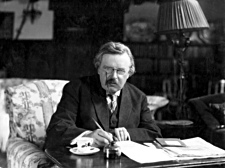
The Strange Music
Other loves may sink and settle, other loves may loose and slack,
But I wander like a minstrel with a harp upon his back,
Though the harp be on my bosom, though I finger and I fret,
Still, my hope is all before me : for I cannot play it yet.
In your strings is hid a music that no hand hath e’er let fall,
In your soul is sealed a pleasure that you have not known at all;
Pleasure subtle as your spirit, strange and slender as your frame,
Fiercer than the pain that folds you, softer than your sorrow’s name.
Not as mine, my soul’s annointed, not as mine the rude and light
Easy mirth of many faces, swaggering pride of song and fight;
Something stranger, something sweeter, something waiting you afar,
Secret as your stricken senses, magic as your sorrows are.
But on this, God’s harp supernal, stretched but to be stricken once,
Hoary time is a beginner, Life a bungler, Death a dunce.
But I will not fear to match them—no, by God, I will not fear,
I will learn you, I will play you and the stars stand still to hear.
G. K. Chesterton
(1874-1936)
The Strange Music
fleursdumal.nl magazine
More in: # Music Archive, Archive C-D, Archive C-D, Chesterton, Gilbert Keith
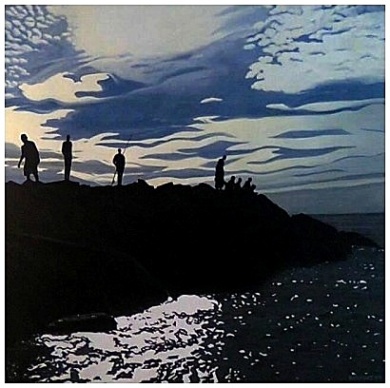
Vincent Berquez©: Fishermen
Vincent Berquez is a London–based artist and poet
fleursdumal.nl magazine for art & literature
More in: Berquez, Vincent, FDM Art Gallery, Vincent Berquez
Thank you for reading Fleurs du Mal - magazine for art & literature